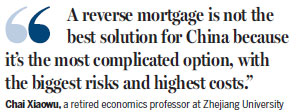Expert says program is not the answer for retirees
Chai Xiaowu, a retired economics professor at Zhejiang University in Hangzhou, was the first scholar in China to study reverse mortgages.
He began researching the topic in the 1990s with a brief, asking how seniors can best use their homes to improve their lives after retirement.
In September 2013, the State Council issued an order facilitating the development of institutional care for the elderly, including trials of reverse mortgage insurance, and when the China Insurance Regulatory Commission was evaluating the feasibility of the product, Chai was invited to provide insights.
He gave the commission a number of detailed suggestions culled from decades of research, but in private he held a strong opinion - there are better ways of doing this.

"A reverse mortgage is not the best solution for China because it's the most complicated option, with the biggest risks and highest costs," he said.
"It is not a pure financial product because it is closely and naturally tied to national policies. The State Council, the China Insurance Regulatory Commission, the Ministry of Civil Affairs, the National Development and Reform Commission, all of them have to work together to make it happen. This is not something a small insurance company can push forward."
Although he believes that using one's home to support post-retirement life is unavoidable, given the aging population and the ever-growing proportion of individual wealth tied up in real estate, Chai also thinks there are better methods of achieving that aim.
He proposed several ways of using a home to improve post-retirement life, including selling a large property in the city and downsizing to the suburbs, and renting one's home and using the money to pay fees at a nursing home.
"However, to my mind, the best way is to have three generations living under the same roof. That's the traditional Chinese way," he said. "It saves money and deepens a family's emotional connections."
(China Daily 08/22/2016 page12)














